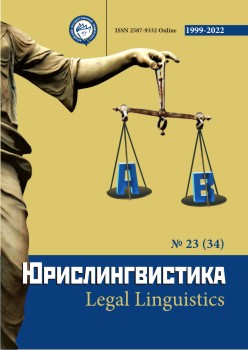The Linguistic and Legal Nature of the Email (from the Practice of Forensic Linguistic Expertise)
Abstract
The article presents an illustration of linguo-expert practice. The text of the email is analyzed in order to identify negative information, verify the nature of the expression of the statement in the form of a statement of facts or value judgment, determine the level of offensiveness of the phrase and its representation in the form of a threat. The specific research material is an Internet text functioning in the field of digital business correspondence. The analysis procedure reflected in the article demonstrates the use of traditional methods in linguo-expert practice: propositional, contextual, distributive and lexico-semantic description of words and expressions. The presented piece of linguistic expertise serves as an illustration of the content-semantic and formal-linguistic study of the conflict text in the framework of the trial. The result of the description is the identification of linguistic markers of a legal nature: the presence of negative information verbalized in the form of an assertion, and offensive expressions aimed at abasement of human dignity of the subjects of the statement. The applied significance of the study is determined both by the expansion of linguistic expert practice and the possibility of using the results as preventive measures aimed at reducing speech aggression in the field of business Internet communication.
Downloads
References
Баранов А.Н.Лингвистическаяэкспертизатекста. Теоретическиеоснования и практика. М., 2013.
Бедулина А.А.Лингвоконфликтологическое описание лексем с оскорбительной семантикой». Кемерово, 2018.
Большой толковый словарь русского языка. гл.ред. С.А. Кузнецов. СПб, 2014.
Вепрева И.Т., Купина Н.А. Экспертный лингвистический анализ спорного текста : учеб.-метод. пособие. Екатеринбург, 2018.
Громова Н.С. Речевая агрессия: от коммуникативных ошибок до правонарушений / Юрислингвистика.- 2016. - №5. - С. 173−189
Доронина С.В. Речевая агрессия как источник правонарушений / Филология и человек. - 2016. - №2. - С. 53−61
Иваненко Г.С. Коммуникация в социальной сети: факторы конфликтогенности / Юрислингвистика. - 2020. - №18. - С. 21−25.
Иваненко Г.С. Роль жанрово-стилистического анализа в судебном исследовании конфликтного текста / Филологические науки. Вопросы теории и практики. - 2012. - №7 (18): в 2-х ч. Ч.I. - С.96−100
Квеселевич Д.И. Толковый словарь ненормативной лексики русского языка: ок. 16000 слов. М., 2005.
Ким Л.Г., Голев Н.Д. Об отношениях адресата, автора и текста в парадигме лингвистического интерпретационизма / Сибирский филологический журнал. - 2008. - №1. - С. 144–153.
Лавицкий А.А., Дединкин А.Л. Динамика современного деструктивного дискурса / Вестник Минского государственного лингвистического университета. Серия 1: Филология. - 2021. - №5 (114). - С.48−55.
Никишин В.Д. Объекты судебной лингвистической экспертизы: новые вызовы криминогенной интернет-коммуникации / Вестник университета им.О.Е. Кутафина. - 2020. - №6(70). - С.79–88.
Памятка по вопросам назначения судебной лингвистической экспертизы: Для судей, следователей, дознавателей, прокуроров, экспертов, адвокатов и юрисконсультов / Под ред. проф. М.В. Горбаневского. М., 2004.
Понятия чести, достоинства и деловой репутации: Спорные тексты СМИ и проблемы их анализа и оценки юристами и лингвистами / Под ред. А.К. Симонова и М.В. Горбаневского. М., 2004.
Российская Е.Р., Галяшина Е.И. Настольная книга судьи. Судебная экспертиза. Теория и практика, типичные вопросы и нестандартные ситуации. М., 2010.
Словарь по русской речевой культуре. М., 2006.
Спорные тексты СМИ и судебные иски:Публикации. Документы. Экспертизы. Комментарии лингвистов / Под ред. проф. М.В. Горбаневского. М., 2005.
Copyright (c) 2022 Елена Новгородова

This work is licensed under a Creative Commons Attribution 4.0 International License.
The authors, which are published in this journal, agree to the following conditions:
1. Authors retain the copyright to the work and transfer to the journal the right of the first publication along with the work, at the same time licensing it under the terms of the Creative Commons Attribution License, which allows others to distribute this work with the obligatory indication of the authorship of this work and a link to the original publication in this journal .
2. The authors retain the right to enter into separate, additional contractual agreements for the non-exclusive distribution of the version of the work published by this journal (for example, to place it in the university depository or to publish it in a book), with reference to the original publication in this journal.
3. Authors are allowed to post their work on the Internet (for example, in a university repository or on their personal website) before and during the review process of this journal, as this may lead to a productive discussion, as well as more links to this published work (See The Effect of Open Access).










